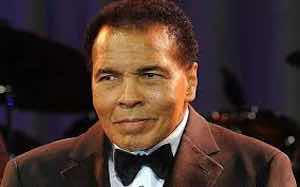By Aaron I. Reichel, Esq. ——Bio and Archives--June 8, 2016
American Politics, News | CFP Comments | Reader Friendly | Subscribe | Email Us
 The headlines in the 1960s and beyond accurately portrayed Muhammad Ali as anything but a moderate in relation to people without color in general, and Jews in particular. Who would have imagined that he would evolve into a model of Muslim moderation and appreciation of Jews as well as of members of other religions? Who would have ever imagined that the person who first came to fame as a self-centered narcissist claiming to be the greatest fighter who ever lived, as an individual, would go through various stages as a Muslim, from one of the most militant to one of the most moderate, and evolve into a humanitarian who would speak out on behalf of all believers in God to the point where now, in death, even more so than in life, as more people find out about his personal evolution, he is positioned to become more influential in tolerating, and even respecting, people of other religions than any other high-profile once-militant Muslim, today, or even in world history!
The headlines in the 1960s and beyond accurately portrayed Muhammad Ali as anything but a moderate in relation to people without color in general, and Jews in particular. Who would have imagined that he would evolve into a model of Muslim moderation and appreciation of Jews as well as of members of other religions? Who would have ever imagined that the person who first came to fame as a self-centered narcissist claiming to be the greatest fighter who ever lived, as an individual, would go through various stages as a Muslim, from one of the most militant to one of the most moderate, and evolve into a humanitarian who would speak out on behalf of all believers in God to the point where now, in death, even more so than in life, as more people find out about his personal evolution, he is positioned to become more influential in tolerating, and even respecting, people of other religions than any other high-profile once-militant Muslim, today, or even in world history!"There are Jewish people who lead good lives. When they die, I believe they're going to heaven. It doesn't matter what religion you are, if you're a good person you'll receive God's blessing. Muslims, Christians and Jews all serve the same God. We just serve him in different ways. "Anyone who believes in One God should also believe that all people are part of one family. God created us all. And all people have to work to get along."Notably, even when the champ was anti-Zionist, he still had the humanity to plead with the Islamic "militants" who had kidnapped Daniel Pearl, the Jewish Wall Street Journal reporter, "to treat Pearl in the same way they would treat any Muslim." After the Muslim kidnappers decided to behead Pearl instead, Ali chose to attend a private memorial service for the murdered Jewish journalist. Also, even in his early days as a relatively militant Muslim, he was still personally close to a number of high profile Jews, as, for example, the iconic sportscaster Howard Cosell (whose name at birth was Cohen), who called so many of his fights, and his assistant trainer and corner man, Drew Brown, a convert to Judaism and reputedly the author of some of Ali's famous trademark poems that captivated audiences throughout the world, setting him apart from all other boxers for his showmanship and aura of intimidation. Later in life, the champ found tolerable Jews much closer to home. His own daughter, Khalia, married a Jew and became Khalia Ali-Wertheimer. Muhammad's grandson, JACOB (renamed Israel in the Bible) had the rare and doubly ironic distinction of being deemed a Jew by Islamic law (which determines religion based on the father's religion) while a Muslim by Jewish law (which determines religion based on the mother's religion). With such a background--or despite such a background--young Jacob identified with his father's religion and culture; he "felt a kinship with Judaism and Jewish culture," and opted to have a bar mitzvah ceremony. It was held at Philadelphia's Congregation Rodeph Sholom (seeker of peace), the oldest Ashkenazic synagogue in the entire Western Hemisphere! Muhammad Ali was present at the event, in 2012, and reportedly "followed everything and looked at the Torah very closely." According to the champ's daughter (Jacob's mother), Muhammad Ali was "supportive in every way."
Support Canada Free Press

View Comments
Aaron Reichel is a New York attorney whose writings have been widely published and republished, some in the U.S. Congressional Record. His most notable book remains Fahrenheit 9-12 – Rebuttal to Fahrenheit 9/11.